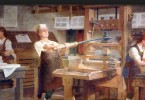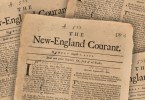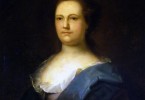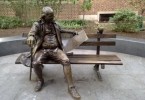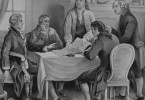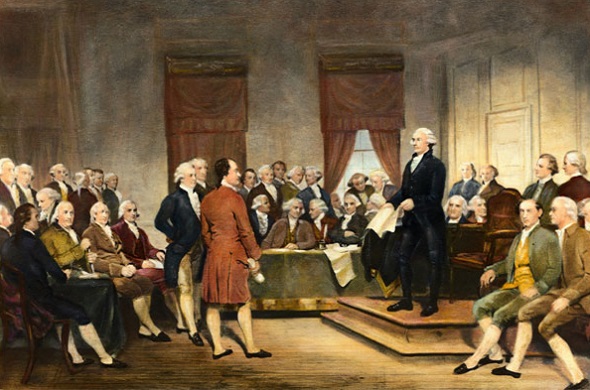
George Washington Addressing the Constitutional Convention, Junius Brutus Stearns, 1856.
The Constitutional Convention, also known as the Philadelphia Convention, met in Philadelphia, Pennsylvania from May 25 to September 17, 1787. It is considered one of the most significant events in the history of the United States as it created the United States Constitution.
Of the 13 original states only Rhode Island did not send representatives. Twelve states appointed 70 individuals to the Constitutional Convention, only 55 attended and 39 signed the Constitution.
Benjamin Franklin was the oldest delegate at 81 years old. The youngest was Jonathan Dayton, representative from New Jersey, he was 26.
Franklin had written a speech that he planned giving on the last day of the Convention, Monday September 17, 1787, before the signing of the Constitution. He was too weak to deliver it and had James Wilson read it to the audience.
The original document did not include many rights and freedoms considered part of the American identity and did not resolve slavery. Many representatives feared the new federal government would overpower the state governments and the liberties that many states had put into their own laws.
The need for a union was necessary. Many states could not agree on a border, others wanted to expand to the west. The purpose of the new constitutions was to work together to defeat the British
Delegates to the Constitutional Convention
Connecticut
- Oliver Ellsworth
- William Samuel Johnson
- Roger Sherman
Delaware
- Richard Bassett
- Gunning Bedford Jr.
- Jacob Broom
- John Dickinson
- George Read
Georgia
- Abraham Baldwin
- William Few
- William Houstoun
- William Pierce
Maryland
- Daniel Carroll
- Luther Martin
- James McHenry
- John Francis Mercer
- Daniel of St Thomas Jenifer
Massachusetts
- Elbridge Gerry
- Nathaniel Gorham
- Rufus King
- Caleb Strong
New Hampshire
- Nicholas Gilman
- John Langdon
New Jersey
- David Brearley
- Jonathan Dayton
- William Houston
- William Livingston
- William Paterson
New York
- Alexander Hamilton
- John Lansing Jr.
- Robert Yates
North Carolina
- William Blount
- William Richardson Davie
- Alexander Martin
- Richard Dobbs Spaight
- Hugh Wiliamson
Pennsylvania
- George Clymer
- Thomas Fitzsimons
- Benjamin Franklin
- Jared Ingersoll
- Thomas Mifflin
- Gouverneur Morris
- Robert Morris
- James Wilson
South Carolina
- Pierce Butler
- Charles Cotesworth Pinckney
- Charles Pinckney
- John Rutledge
Virginia
- John Blair
- James Madison
- George Mason
- James McClurg
- Edmund Randolph
- George Washington
- George Wythe
Rhode Island did not send representatives to the Convention.
Benjamin Franklin’s Speech at the Constitutional Convention
I confess that there are several parts of this constitution which I do not at present approve, but I am not sure I shall never approve them: For having lived long, I have experienced many instances of being obliged by better information, or fuller consideration, to change opinions even on important subjects, which I once thought right, but found to be otherwise. It is therefore that the older I grow, the more apt I am to doubt my own judgment, and to pay more respect to the judgment of others. Most men indeed as well as most sects in Religion, think themselves in possession of all truth, and that wherever others differ from them it is so far error. Steele a Protestant in a Dedication tells the Pope, that the only difference between our Churches in their opinions of the certainty of their doctrines is, the Church of Rome is infallible and the Church of England is never in the wrong. But though many private persons think almost as highly of their own infallibility as of that of their sect, few express it so naturally as a certain french lady, who in a dispute with her sister, said “I don’t know how it happens, Sister but I meet with no body but myself, that’s always in the right-Il n’y a que moi qui a toujours raison.”
In these sentiments, Sir, I agree to this Constitution with all its faults, if they are such; because I think a general Government necessary for us, and there is no form of Government but what may be a blessing to the people if well administered, and believe farther that this is likely to be well administered for a course of years, and can only end in Despotism, as other forms have done before it, when the people shall become so corrupted as to need despotic Government, being incapable of any other. I doubt too whether any other Convention we can obtain, may be able to make a better Constitution. For when you assemble a number of men to have the advantage of their joint wisdom, you inevitably assemble with those men, all their prejudices, their passions, their errors of opinion, their local interests, and their selfish views. From such an assembly can a perfect production be expected? It therefore astonishes me, Sir, to find this system approaching so near to perfection as it does; and I think it will astonish our enemies, who are waiting with confidence to hear that our councils are confounded like those of the Builders of Babel; and that our States are on the point of separation, only to meet hereafter for the purpose of cutting one another’s throats. Thus I consent, Sir, to this Constitution because I expect no better, and because I am not sure, that it is not the best. The opinions I have had of its errors, I sacrifice to the public good. I have never whispered a syllable of them abroad. Within these walls they were born, and here they shall die. If every one of us in returning to our Constituents were to report the objections he has had to it, and endeavor to gain partizans in support of them, we might prevent its being generally received, and thereby lose all the salutary effects & great advantages resulting naturally in our favor among foreign Nations as well as among ourselves, from our real or apparent unanimity. Much of the strength & efficiency of any Government in procuring and securing happiness to the people, depends, on opinion, on the general opinion of the goodness of the Government, as well as well as of the wisdom and integrity of its Governors. I hope therefore that for our own sakes as a part of the people, and for the sake of posterity, we shall act heartily and unanimously in recommending this Constitution (if approved by Congress & confirmed by the Conventions) wherever our influence may extend, and turn our future thoughts & endeavors to the means of having it well administred.
On the whole, Sir, I can not help expressing a wish that every member of the Convention who may still have objections to it, would with me, on this occasion doubt a little of his own infallibility, and to make manifest our unanimity, put his name to this instrument.-


